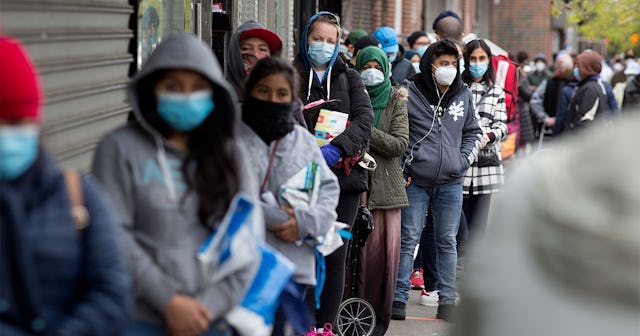The U.S. Lost 140,000 Jobs Last Month — And All Of Them Belonged To Women

Black and Latina women are suffering the worst jobs losses, while white women and men are seeing small gains
Women have always faced an uphill battle when it comes to finding equitable employment. Women are far more likely than men to work part time jobs (because of their caregiving duties at home, of course). And as of the end of 2019, when the economy was supposedly booming, women earned just shy of 82 cents for every dollar earned by men.
That all makes the latest U.S. jobs report even more depressing. During the final month of 2020, the country lost 140,000 total jobs — and every, single one of them was held by women.
The new data for December 2020 was released Friday, and showed that the net 140,000 jobs lost actually looked like this: Men gained 16,000 positions, while women lost 156,000.
But what the headlines about that data tend to gloss over is the fact that women of color are being hurt disproportionately by these losses. A separate government report showed that white women are gaining employment, while Black and Latina women are losing jobs en masse.
There are a few reasons for this, all of them exacerbating by the ongoing (and worsening) coronavirus pandemic. The most likely reason for such staggering losses is that Black and Latina women are more likely to work in the employment sectors that the pandemic has absolutely devastated: education, hospitality, and retail. These roles are not often flexible when it comes to things like sick leave or the ability to work from home, so women who have faced school and daycare closures or sick family members at home have had to make choices: Take care of their families and lose their jobs, or remain employed while navigating a childcare crisis.
“Those sectors are less likely to have flexibility, so when employers are inflexible or women can’t come to work because of caregiving responsibilities — they have to exit the workforce,” C. Nicole Mason, president and CEO of the Institute for Women’s Policy Research, told CNN.
Overall, men and women started 2020 on almost equal footing — women held 50.03 percent of all jobs at the start of the year. But the pandemic put a quick end to that. Now, women are down 5.4 million jobs since February. Men, on the other hand, are down just 4.4 million positions.
“We don’t have the pandemic under control. Schools and daycares are still closing, and we know that’s what’s impacting women’s ability to reenter the workforce and sustain jobs,” Mason said.
Among women, Latinas currently have the highest unemployment rate — 9.1 percent. Black women are currently facing an unemployment rate of 8.4 percent. White women have the lowest unemployment rate of their gender: 5.7 percent.